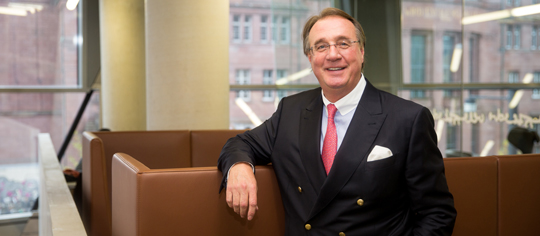Attracting Sponsors and Students
Freiburg, Mar 09, 2017
A small team in New York City has been working for the past year to establish contacts, convince investors, recruit students, and attract partners in North America for the University of Freiburg's University College Freiburg.
 The head office of the Freiburg Alumni Club North America is in New York – agencies in other cities are in planning. Photo: Sandra Meyndt
The head office of the Freiburg Alumni Club North America is in New York – agencies in other cities are in planning. Photo: Sandra Meyndt
We are at the corner of East 49th Street and 1st Avenue in New York City, USA, looking out at the East River and the headquarters of the United Nations. This is the location of the German House, home of the Permanent Mission of Germany to the United Nations and a German Consulate-General, as well as branch offices of research organizations like the German Research Foundation and offices of German universities. The University of Freiburg and its partners in the Eucor – The European Campus alliance, including the Universities of Basel, Strasbourg, and Mulhouse and the Karlsruhe Institute of Technology, are now also represented here: The "Liaison Office North America" opened officially in April 2016. The liaison officer is Dr. Markus Lemmens, an experienced science management expert.
The purpose of the liaison office is to raise the profile of the University of Freiburg and the European Campus in North America. What this involves above all is establishing contacts with key people from the scientific, industrial, and political sectors, as well as with Freiburg alumni and media representatives. The goals include attracting investors and thus fostering technology transfer, supporting efforts to recruit students and scholars, and establishing and strengthening partnerships with North American institutions and companies. The office also coordinates the University of Freiburg's growing Alumni Club North America, which now includes groups in San Francisco, Washington, D.C., and Montreal, Canada, in addition to the head office in New York. More are in planning – in cities like Los Angeles, Denver, Boston, Seattle, and New Haven.
Two Leaders at the Helm
The stage is thus set for the University of Freiburg's first large-scale publicity campaign in North America: The goal is to attract sponsors and students for the University College Freiburg (UCF) and its English-taught bachelor's program Liberal Arts and Sciences (LAS). The initiative was launched by the American steel entrepreneur Jeffrey Himmel, founder and president of the Artco Group. He is president of the Freiburg Alumni Club North America, which is currently preparing the campaign together with a fundraising agency with experience in the field of higher education. Himmel has also won over a further prominent University of Freiburg alumnus for the campaign: Caroll H. Neubauer, member of the board of directors of B. Braun Melsungen AG and president of the German American Chamber of Commerce in New York, will join Himmel in spearheading the campaign.
Nicolas Scherger
"It Will Be a Surefire Success"
Caroll H. Neubauer is campaigning for the University College Freiburg in North America
He is a member of the board of directors of B. Braun Melsungen AG, president of the German American Chamber of Commerce in New York – and a devoted University of Freiburg alumnus: Caroll H. Neubauer is spearheading the campaign for the benefit of the University College Freiburg (UCF) together with the steel entrepreneur Jeffrey Himmel. Nicolas Scherger spoke with the jurist and manager about the UCF, the University of Freiburg's learning lab.
 Acquire a broad education first, then choose a specialization: Caroll H. Neubauer considers the University College Freiburg's approach better than a classical academic education.
Acquire a broad education first, then choose a specialization: Caroll H. Neubauer considers the University College Freiburg's approach better than a classical academic education.
Photo: Baschi Bender
Mr. Neubauer, what fascinates you about the UCF and its flagship degree program, the Bachelor in Liberal Arts and Sciences (LAS)?
Caroll H. Neubauer: The novelty. The students don't have to decide right off the bat that they want to become a jurist, doctor, engineer, or teacher but first receive a broad education that can serve as a basis for later specialization and development. I consider the model better than the classical German education I received. I find it great that the University of Freiburg, an institution with so much history and culture, is taking this innovative path.
You began your studies by enrolling in a law program in Freiburg in the 1970s, so you chose to major in a specific field. Would you do things differently today in view of the UCF/LAS option?
My degree program provided me an outstanding education. I love being a jurist, and I'm proud to call myself a Freiburg jurist. The legal thinking I was taught here is still an essential part of my strategy for success today. But if I had the chance to start all over again, I could see myself acquiring a broad general education at the UCF first and then going on to study law. If I had done that, it would have made a lot of things easier for me in my later work as a manager in the industrial sector. If public finance had been a required subject in my degree program, for instance, I would have had a lot less trouble figuring out how to deal with operating figures or read a balance sheet when I first became a manager.
How do you aim to convince potential students and sponsors in North American of the UCF?
I don't think we'll need to do anything special to advertise the UCF at all. It'll be enough to just make it known. The students receive outstanding training in English, learn German, get to know European culture on the cross-border European Campus with the partner universities on the Upper Rhine – and all that in Freiburg, a town with a quality of life only few cities in the world can match. That's why I'm sure it will be a surefire success. I also hope we'll find more people to support us in our effort to create a UCF campus in the Old University and its courtyard. The UCF has an incredibly attractive opportunity to make itself a home for the future here.
What prospects do you see for graduates?
I find it outstanding that the students are taught in English, the world language. A lot of people speak English, but only few really speak it fluently. The language skills are therefore a great advantage for the LAS graduates. But it will be a challenge to get them into jobs directly after they finish their bachelor's degree, so that they can first achieve a certain level of professional maturity and then, equipped with a wealth of experience, earn their master's degree. The university and alumni like me will work to support them in this endeavor.

